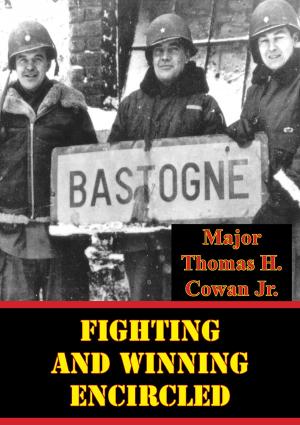| Author: | Major John R. Carter | ISBN: | 9781786252760 |
| Publisher: | Tannenberg Publishing | Publication: | November 6, 2015 |
| Imprint: | Tannenberg Publishing | Language: | English |
| Author: | Major John R. Carter |
| ISBN: | 9781786252760 |
| Publisher: | Tannenberg Publishing |
| Publication: | November 6, 2015 |
| Imprint: | Tannenberg Publishing |
| Language: | English |
The belief that airpower is inherently offensive is a recurrent theme throughout airpower theory and doctrine. Before World War I, dogmatic belief in the dominance of the offense in land warfare affected the military decisions which resulted in the disaster of the trenches. Termed the “cult of the offensive” by scholars, faith in offense became so unshakable in pre-1914 Europe that military organizations dismissed as irrelevant the numerous indications of the waning power of the offense as technological developments strengthened the defense. With airpower’s professed inclination for offense, could a cult of the offensive perniciously trap airpower doctrine and lead to similarly disastrous consequences?
The study begins by establishing the theoretical background necessary for case study analysis. Airpower defense is defined as those operations conducted to deny another force’s air operations in a designated airspace. Airpower offenses are those operations in the airspace defended by another, or operations conducted outside of one’s actively defended airspace. The relationship between offense and defense is dissected to discover that airpower defense enjoys neither an advantage of position nor of time, so traditional Clausewitzian views relative to the power of the defense do not apply to airpower. Next, the study describes those factors which may inject, or reinforce, a preferential bias for offense into airpower strategy and doctrine. A cult of the offensive is defined as an organizational belief in the power of offense so compelling that the military organization no longer evaluates its offensive doctrine objectively. This leads to an examination of the ramifications postulated to result from offensive ideology.
The belief that airpower is inherently offensive is a recurrent theme throughout airpower theory and doctrine. Before World War I, dogmatic belief in the dominance of the offense in land warfare affected the military decisions which resulted in the disaster of the trenches. Termed the “cult of the offensive” by scholars, faith in offense became so unshakable in pre-1914 Europe that military organizations dismissed as irrelevant the numerous indications of the waning power of the offense as technological developments strengthened the defense. With airpower’s professed inclination for offense, could a cult of the offensive perniciously trap airpower doctrine and lead to similarly disastrous consequences?
The study begins by establishing the theoretical background necessary for case study analysis. Airpower defense is defined as those operations conducted to deny another force’s air operations in a designated airspace. Airpower offenses are those operations in the airspace defended by another, or operations conducted outside of one’s actively defended airspace. The relationship between offense and defense is dissected to discover that airpower defense enjoys neither an advantage of position nor of time, so traditional Clausewitzian views relative to the power of the defense do not apply to airpower. Next, the study describes those factors which may inject, or reinforce, a preferential bias for offense into airpower strategy and doctrine. A cult of the offensive is defined as an organizational belief in the power of offense so compelling that the military organization no longer evaluates its offensive doctrine objectively. This leads to an examination of the ramifications postulated to result from offensive ideology.


![Cover of the book Airborne Operations In World War II, European Theater [Illustrated Edition] by Major John R. Carter](https://www.kuoky.com/images/2015/november/300x300/9781786252975-y4Y7_300x.jpg)

![Cover of the book Helicopters in Irregular Warfare: Algeria, Vietnam, and Afghanistan [Illustrated Edition] by Major John R. Carter](https://www.kuoky.com/images/2014/august/300x300/9781782895152-A0GJ_300x.jpg)


![Cover of the book Billy Mitchell: Stormy Petrel Of The Air [Illustrated Edition] by Major John R. Carter](https://www.kuoky.com/images/2015/november/300x300/9781786252463-h6c3_300x.jpg)


![Cover of the book A House In Bali [Illustrated Edition] by Major John R. Carter](https://www.kuoky.com/images/2015/november/300x300/9781786256232-Jvnm_300x.jpg)


![Cover of the book The Red Battle Flyer [Illustrated Edition] by Major John R. Carter](https://www.kuoky.com/images/2015/november/300x300/9781786255563-jnoX_300x.jpg)

